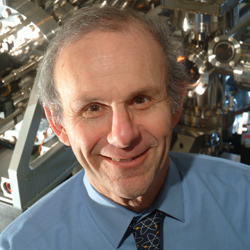David Seidman Elected to National Academy of Engineering
Seidman honored for his contributions to understanding materials on the atomic scale
Northwestern Engineering’s David N. Seidman, whose work has led to an improved understanding of materials on the atomic scale, has been elected to the National Academy of Engineering (NAE).
Election to the academy is among the highest professional distinctions accorded to an engineer. Seidman is one of 83 new members and 16 new foreign members announced by the NAE today, February 7.
Seidman was cited by NAE for “contributions to understanding of materials at the atomic scale, leading to advanced materials and processes.” He will be formally inducted during a ceremony at the NAE’s annual meeting on September 30, 2018 in Washington, D.C.
 Seidman is a Walter P. Murphy Professor of Materials Science and Engineering and the founding director of the Northwestern University Center for Atom-Probe Tomography (NUCAPT), the largest atom-probe tomography group in the United States. NUCAPT’s equipment gives researchers the ability to see the internal structures of materials — on the subnano- to nanoscale — to help them better understand the materials’ properties and how those properties have temporally evolved. This information can be used to improve various materials properties, such as making them lighter and stronger.
Seidman is a Walter P. Murphy Professor of Materials Science and Engineering and the founding director of the Northwestern University Center for Atom-Probe Tomography (NUCAPT), the largest atom-probe tomography group in the United States. NUCAPT’s equipment gives researchers the ability to see the internal structures of materials — on the subnano- to nanoscale — to help them better understand the materials’ properties and how those properties have temporally evolved. This information can be used to improve various materials properties, such as making them lighter and stronger.
“We are tremendously proud to see David recognized at the highest level in his field,” said Julio M. Ottino, dean of the McCormick School of Engineering. “Since joining Northwestern more than thirty years ago, he has been an example of an outstanding researcher, collaborator, and colleague.”
Seidman’s research aims to understand physical phenomena in a wide range of material systems on an atomic scale. His research group uses highly sophisticated microscopy and spectroscopy instrumentation to study interfaces on a subnanoscale level. He is uses these tools to develop high-temperature cobalt-based alloys for use as turbine blades in aircrafts and for producing electricity, and to study the temporal evolution of aluminum-scandium alloys on the subnanoscale enabling their use at very elevated temperatures, to understand the temporal evolution of the nanostructures of model nickel-based superalloys, and to study silicon nanowires that are processed in new ways.
Seidman has received several awards, including being twice selected as a John Simon Guggenheim Memorial Foundation Fellow and receiving an Alexander von Humboldt Stiftung Prize. He also has received an IBM Faculty Research Award, the Materials Research Society’s David Turnbull Lecture Award, ASM International’s Albert Sauveur Achievement Award and its Gold Medal, the Max Planck Research Award from the Alexander von Humboldt Foundation and Max Planck Society, and the Robert Lansing Hardy Gold Medal and the Robert Franklin Mehl Award from TMS.
He is a fellow of the American Academy of Arts and Sciences, American Association for the Advancement of Science, Materials Research Society, TMS, American Physical Society, International Field-Emission Society, Microscopy Society of America, and ASM International.
Founded in 1964, the National Academy of Engineering is a private, independent, nonprofit institution that provides engineering leadership in service to the nation. It has more than 2,000 peer-elected members and foreign associates, senior professionals in business, academia and government, who are among the world’s most accomplished engineers.